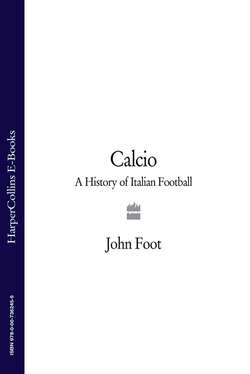Читать книгу Calcio: A History of Italian Football - John Foot - Страница 24
The First Scandal. The Rosetta Case
ОглавлениеIn a society racked with scandal, suspicion, accusation and counter-accusation, and where the rule of law has always been something of an option, Italian football was caught up in controversy almost from the very beginning. Many early championships were marked by intense debate, as the football federation struggled to impose any kind of authority over the game. In 1906 Juventus refused to play in the title playoff against Milan after a change of venue and 1910 saw the Pro Vercelli ‘baby-players’ protest. The post-World War One period was marked by splits, debates and arguments amongst the various clubs and federations.
Italian football’s first real scandal became known as the ‘Rosetta case’. Virginio Rosetta was one of the most admired and prized defenders of the heroic early phase of calcio history. Born in Vercelli in 1902, he is usually recognized as Italy’s first professional footballer and was the subject of the first big transfer fee. Rosetta’s move was also the spark, for the first, but certainly not for the last time, of protests by one set of fans against the transfer of a player. An accountant by trade, Rosetta was idolized in Vercelli. As he approached his second championship victory with the club in three years (in 1922–23) rumours began to spread of an offer from Juventus. Rosetta had, it appeared, been tapped up. At that time Luigi Bozino, criminal lawyer and Pro Vercelli’s president, was also president of the FIGC, so the case took on football-wide proportions.
A lot of money was involved. A cheque for at least 50,000 lire went directly to Bozino and Rosetta’s new highly-paid accountancy post in Turin was underwritten by Juventus (and therefore by their owners FIAT). The Rosetta scandal led to the resignation of a number of leading members of the various football federations, and threatened to split the world of calcio wide open. Moreover for the first time the amount of money paid for a footballer led to scandal in itself. It was seen as immoral to spend so much cash on what was essentially just a game. The scandal dragged on. Rosetta moved to Juventus, but after just three games of the 1923–24 season, the federation ruled that the transfer had been irregular. Juventus were docked points for the three games Rosetta had played for them. Without this penalization, Juventus would have won the northern league. The scandal had effectively cost them the championship. Furious at this decision, Juventus’s management threatened to pull their team out altogether. This is a unique scandal in Italian football history – with Juventus as the victims of an injustice. The trend since then has been for the FIAT club to be the benefactors of scandal and favouritism.
The controversial transfer was finally completed the following season, and Rosetta proved to be well worth the money. Pro Vercelli’s fans were still angry at Rosetta’s ‘betrayal’ when he came back in 1929 for a game against their team. He went on to win six championships with Juve as well as the 1934 World Cup. Rosetta’s move also highlighted the increasing power of the big clubs, and the beginning of the long decline of the strong provincial sides who had taken calcio by storm in the early part of the century. Some writers even trace the deep hatred of many Italian fans towards Juventus to the ‘Rosetta case’.
